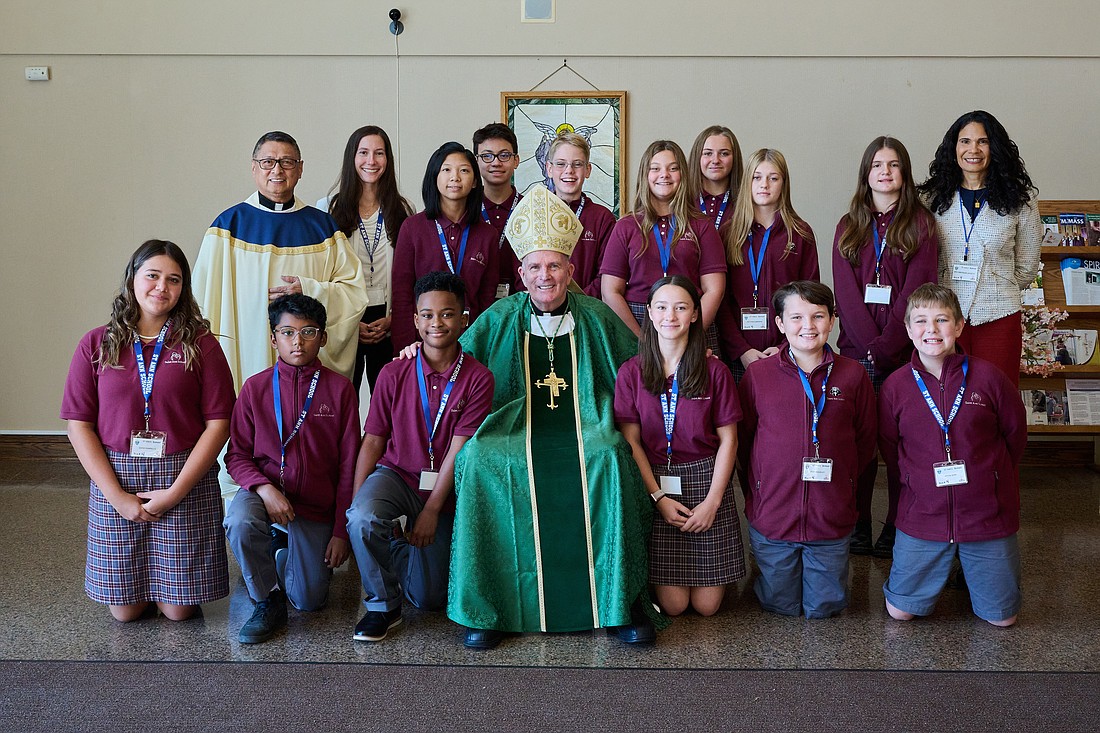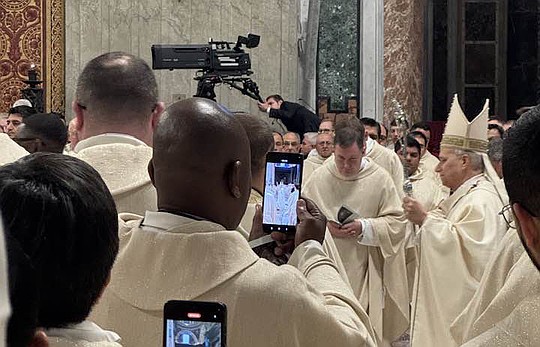The unequivocal value of Catholic education
January 26, 2024 at 4:51 p.m.

A message for Catholic Schools Week 2024
When a child is baptized in the Catholic Church, his/her parents, supported by godparents, make promises to help their child grow in the Church’s faith. Parents are their “first teachers,” their “first preachers” of the faith and, as a result, the family home becomes the “first Catholic school” and a “domestic Church.”
Without their direct and active involvement in their child’s Catholic faith formation, however, faith doesn’t happen, it won’t happen. Some parents mistakenly suggest that their children will choose to believe or not on their own later in life. What a disservice! Simple things like teaching and “hearing” a child’s prayers, telling Bible stories, taking a child to Church, showing a child the difference between right and wrong, giving good example, treating people with respect and charity and so on, these are all part of Catholic parents’ primary responsibilities to their baptized Catholic children.
What if parents don’t exercise their faith responsibilities for whatever reason? What happens to the faith of their baptized child? The answer is simple: nothing. Bringing a child into the Catholic Church through Baptism without making him/her feel welcome, at home, familiar with the Church at least on a level appropriate to a child make him/her a stranger to and within the community that is home to the Catholic faith.
Thank God for Catholic schools! (Thank God, also, for Catholic religious education programs in our parishes!) Although nothing can substitute for parents’ active witness to the faith in the Catholic home, Catholic schools should be an extension of the Catholic home and faith, building on its foundation or, more often than ever before, becoming a first foundation where it does not yet exist.
In either case, Catholic schools are or should be partners with Catholic parents forming and engaging their children in Catholic faith, along with other school subjects as well. The goal is to help children become good Catholics, with knowledge of their faith, exposure to prayer and the sacraments, becoming part of their parish church community and the experience of living and relating to others —adults and peers alike — with respect and charity. These are all things taught in Catholic schools, through their religion curriculum and Christ-centered environment. And children live what they learn.
“Catholic Schools Week” annually provides all Catholics — whether they have children in Catholic schools or not — with the chance to think about how the faith is taught and witnessed and the “value” that Catholic schools offer to children, to parents, to families, to the Church and to society at large with respect to that faith and its influence.
Is that “value” worth the sacrifice it takes for parents and families to provide Catholic school education to their children when public school education is readily available without any extra cost required? The research has been done and a majority of graduates of Catholic schools at the primary and secondary levels have demonstrated greater success across the board in a variety of measures than their public school counterparts. Having worked in Catholic education most of my life, I can state without hesitation, Catholic education is definitely worth it!
We live at a time, however, when many Catholic schools throughout the country , including our own Diocese, are facing significant challenges to their continued operations because of steadily declining enrollments and the resulting strain on available financial resources; the inability of parishes and dioceses to provide subsidies to Catholic schools at past levels; competition with public schools for faculty, staff at higher salaries and competition for facilities; demographic shifts in traditionally Catholic population centers; growing secularization among Catholics regarding Catholic teachings and practices; and, as mentioned before, questioning the “value” afforded by instruction in our Catholic schools, especially in the Catholic faith and its influence.
The key to the future of primary and secondary Catholic schools lies in the hands of Catholic parents and families as well as non-Catholics who “value” Catholic education for their children. It comes down to a decision. Catholic schools do the job and do it well. A Catholic environment with its emphasis on caring for the whole person; a commitment to unity of purpose provided by Catholic faith, identity and mission; the presence of institutional structure and teaching personal discipline; adherence to codes of conduct and appropriate behavior; advocacy of social justice and service; excellence in education and a proven record of academic success; religious instruction; the personal commitment of deeply dedicated administration, faculty and staff (a profound thanks to them!), a sense of partnership with parents and family, the loyalty of alumni — these characteristics of Catholic schools demonstrate the “value” that Catholic education provides.
A healthy and strong society needs good public schools. The history of American education reveals that good Catholic schools have also made a substantial contribution to society and are, likewise, necessary. “Catholic Schools Week” is an annual reminder that Catholic schools continue to make an incredible, faith-based difference in the lives of students with a “value” worth choosing. My mantra has never changed through all these years: “Catholic Schools Have it All” … and give it all, in the Lord!
Related Stories
Thursday, January 08, 2026
E-Editions
Events
A message for Catholic Schools Week 2024
When a child is baptized in the Catholic Church, his/her parents, supported by godparents, make promises to help their child grow in the Church’s faith. Parents are their “first teachers,” their “first preachers” of the faith and, as a result, the family home becomes the “first Catholic school” and a “domestic Church.”
Without their direct and active involvement in their child’s Catholic faith formation, however, faith doesn’t happen, it won’t happen. Some parents mistakenly suggest that their children will choose to believe or not on their own later in life. What a disservice! Simple things like teaching and “hearing” a child’s prayers, telling Bible stories, taking a child to Church, showing a child the difference between right and wrong, giving good example, treating people with respect and charity and so on, these are all part of Catholic parents’ primary responsibilities to their baptized Catholic children.
What if parents don’t exercise their faith responsibilities for whatever reason? What happens to the faith of their baptized child? The answer is simple: nothing. Bringing a child into the Catholic Church through Baptism without making him/her feel welcome, at home, familiar with the Church at least on a level appropriate to a child make him/her a stranger to and within the community that is home to the Catholic faith.
Thank God for Catholic schools! (Thank God, also, for Catholic religious education programs in our parishes!) Although nothing can substitute for parents’ active witness to the faith in the Catholic home, Catholic schools should be an extension of the Catholic home and faith, building on its foundation or, more often than ever before, becoming a first foundation where it does not yet exist.
In either case, Catholic schools are or should be partners with Catholic parents forming and engaging their children in Catholic faith, along with other school subjects as well. The goal is to help children become good Catholics, with knowledge of their faith, exposure to prayer and the sacraments, becoming part of their parish church community and the experience of living and relating to others —adults and peers alike — with respect and charity. These are all things taught in Catholic schools, through their religion curriculum and Christ-centered environment. And children live what they learn.
“Catholic Schools Week” annually provides all Catholics — whether they have children in Catholic schools or not — with the chance to think about how the faith is taught and witnessed and the “value” that Catholic schools offer to children, to parents, to families, to the Church and to society at large with respect to that faith and its influence.
Is that “value” worth the sacrifice it takes for parents and families to provide Catholic school education to their children when public school education is readily available without any extra cost required? The research has been done and a majority of graduates of Catholic schools at the primary and secondary levels have demonstrated greater success across the board in a variety of measures than their public school counterparts. Having worked in Catholic education most of my life, I can state without hesitation, Catholic education is definitely worth it!
We live at a time, however, when many Catholic schools throughout the country , including our own Diocese, are facing significant challenges to their continued operations because of steadily declining enrollments and the resulting strain on available financial resources; the inability of parishes and dioceses to provide subsidies to Catholic schools at past levels; competition with public schools for faculty, staff at higher salaries and competition for facilities; demographic shifts in traditionally Catholic population centers; growing secularization among Catholics regarding Catholic teachings and practices; and, as mentioned before, questioning the “value” afforded by instruction in our Catholic schools, especially in the Catholic faith and its influence.
The key to the future of primary and secondary Catholic schools lies in the hands of Catholic parents and families as well as non-Catholics who “value” Catholic education for their children. It comes down to a decision. Catholic schools do the job and do it well. A Catholic environment with its emphasis on caring for the whole person; a commitment to unity of purpose provided by Catholic faith, identity and mission; the presence of institutional structure and teaching personal discipline; adherence to codes of conduct and appropriate behavior; advocacy of social justice and service; excellence in education and a proven record of academic success; religious instruction; the personal commitment of deeply dedicated administration, faculty and staff (a profound thanks to them!), a sense of partnership with parents and family, the loyalty of alumni — these characteristics of Catholic schools demonstrate the “value” that Catholic education provides.
A healthy and strong society needs good public schools. The history of American education reveals that good Catholic schools have also made a substantial contribution to society and are, likewise, necessary. “Catholic Schools Week” is an annual reminder that Catholic schools continue to make an incredible, faith-based difference in the lives of students with a “value” worth choosing. My mantra has never changed through all these years: “Catholic Schools Have it All” … and give it all, in the Lord!










